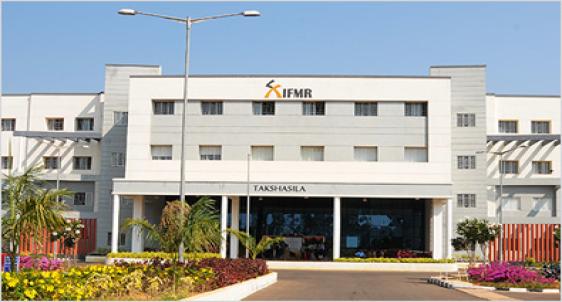
The Institute for Financial Management and Research (IFMR), has commenced its 18th batch of post graduate program in management (and its first ever MBA batch) on June 1, 2017. This is the largest ever batch with 240 students marked with high academic and gender diversity.
The inauguration was done by IFMR new President Mr. Kapil Vishwanathan, who spoke about his own MBA days at Harvard Business School. This was followed by a lively interaction with the incoming Batch. Questions ranged from Macro-economic concerns (Trump effect), to Conflict between Founders and Managers (Infy effect).
Director PK Biswas mentioned in his welcome address that the admission selection process was conducted over a period of two months across 17 cities. The new batch has students from 97 towns and cities spread across 21 states of India.
Ratio of women increases to 36% from 30%
IFMR has traditionally enjoyed good patronage from women applicants and has a track record of having more than 30% women at all stages – application, shortlisting, and selection. However the 2017-19 batch has broken the past record and the new batch has a ratio of 36% women in the class room.
Since IFMR does not award any bonus marks, extra weightage to women candidates, this achievement is significant. Speaking on this achievement, Dr P K Biswas Director IFMR says, “That it has taken place without any quota or bonus marks validates our belief that given fair opportunity, women will come to management.”
26% students with commerce back ground
There has been a surge in students with commerce background this year from the usual 17%-18% to 26%. The proportion of engineers has remained more or less the same around 70%.
55% freshers in new batch
Over the last few years the proportion of students with work experience has been declining and those of freshers has increased. In 2015 there were 58% candidates with work experience, in 2016 this ratio declined to 52% and in 2017 there are 45% candidates with work experience and 55% are fresh graduates.
Prof G R Chandrasekar, PGP Chairman proposed the vote of thanks concluding the inauguration day ceremony.
The induction and orientation programme, which involved interaction with alumni, practicing managers, and faculty to get both functional and sectoral perspectives, was done on a fast track basis and regular classes commenced on Monday 12th June. The campus is already buzzing with industry focused academic activities ranging from case discussions to business dissection of annual reports.
The Institute for Financial Management and Research (IFMR), Chennai was established as a non profit organization in 1970. IFMR is recognized as an Institution of National Importance by the Ministry of Finance. It is an approved institution by the University of Madras for pursuing a Ph.D. degree in Finance and Economics. The B school offers AICTE approved 2-year full-time PGDM programs, 3 years part time programmes as well as PhD programme. IFMR has set up 7 Research centres.
IFMR has set us a new campus at Sri City which is much spacious and is already functional. IFMR’s new campus is spread across 40 acres in Sri City. Sri City is located strategically along National Highway-5 on the border of two industrialized states, Andhra Pradesh and Tamil Nadu. The place is in the heart of business and trade in the midst of global organizations. With its neighbors being global giants like Kellogg’s, Cadbury, Colgate, Pepsico, Isuzu Motor, Alstom, Kobelco, Lavazza and Danieli, who are setting up projects. IFMR students will have ample opportunities with all of the biggest names in the corporate world.
The Institute is built in 3,00,000 sq.ft that covers the main academic block consisting of classrooms, computer labs, seminar halls, faculty cabins, library, meeting rooms, placement cell, residential hostel.
Stay tuned to MBAUniverse.com for more updates on IFMR


























